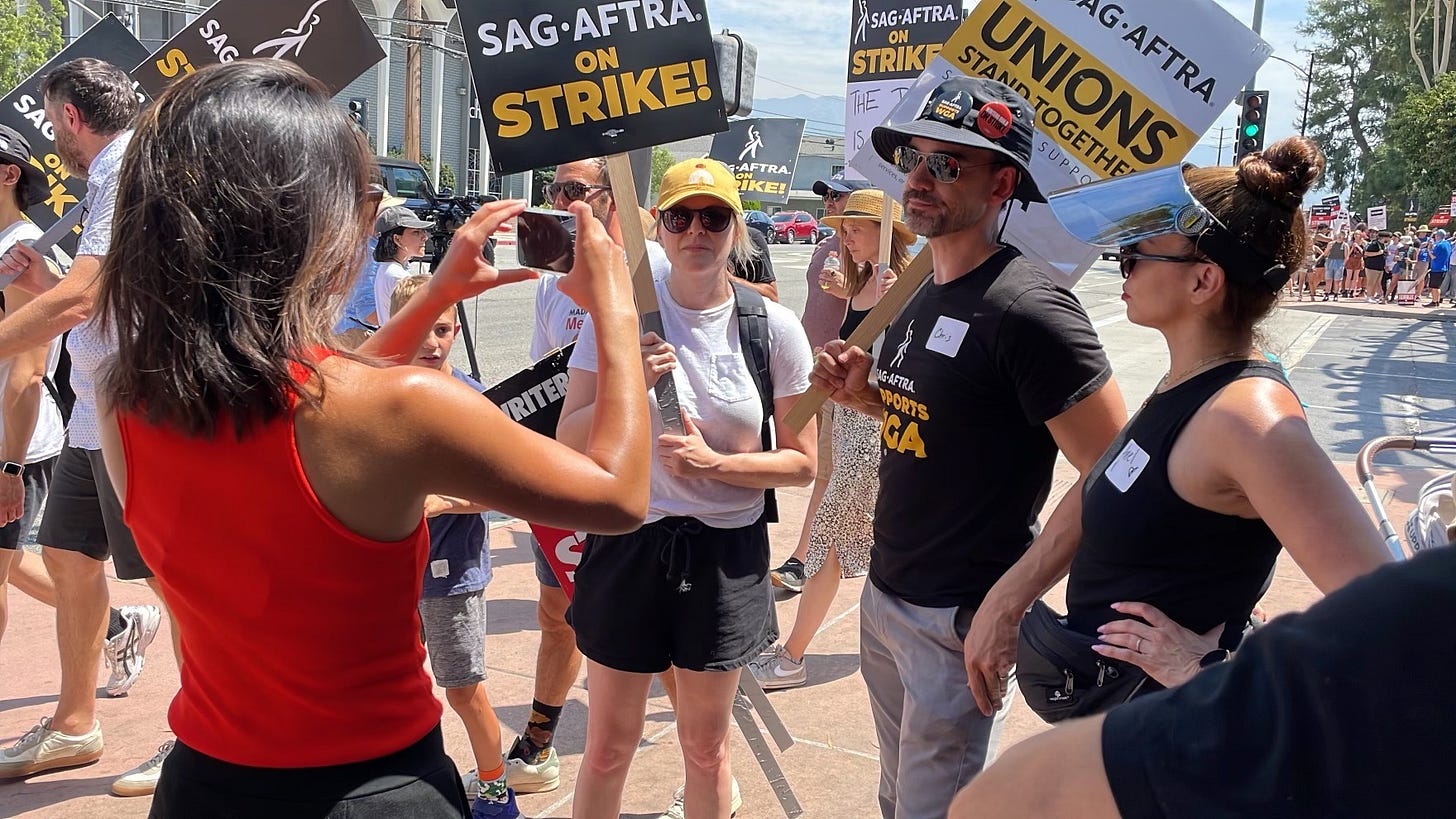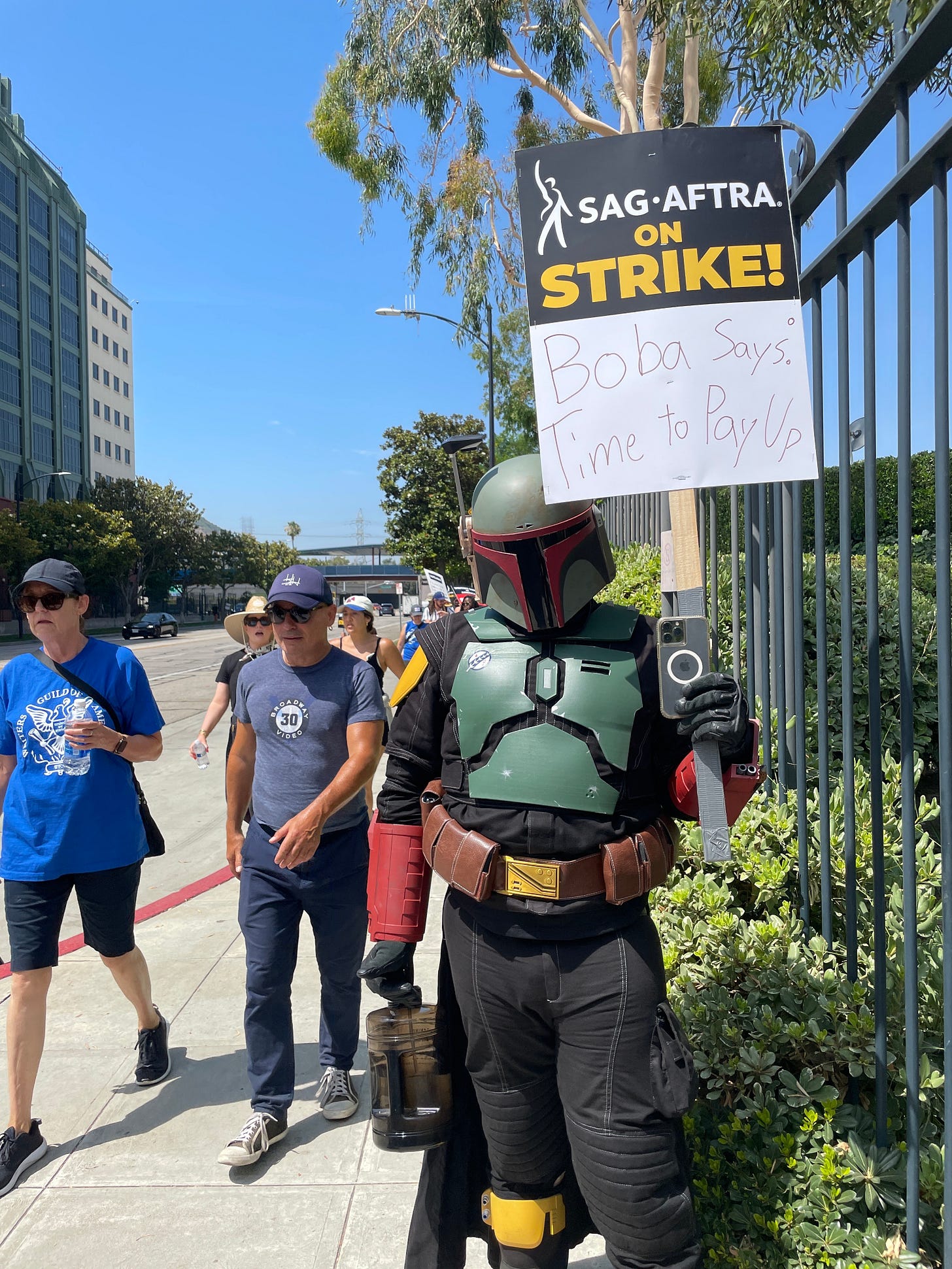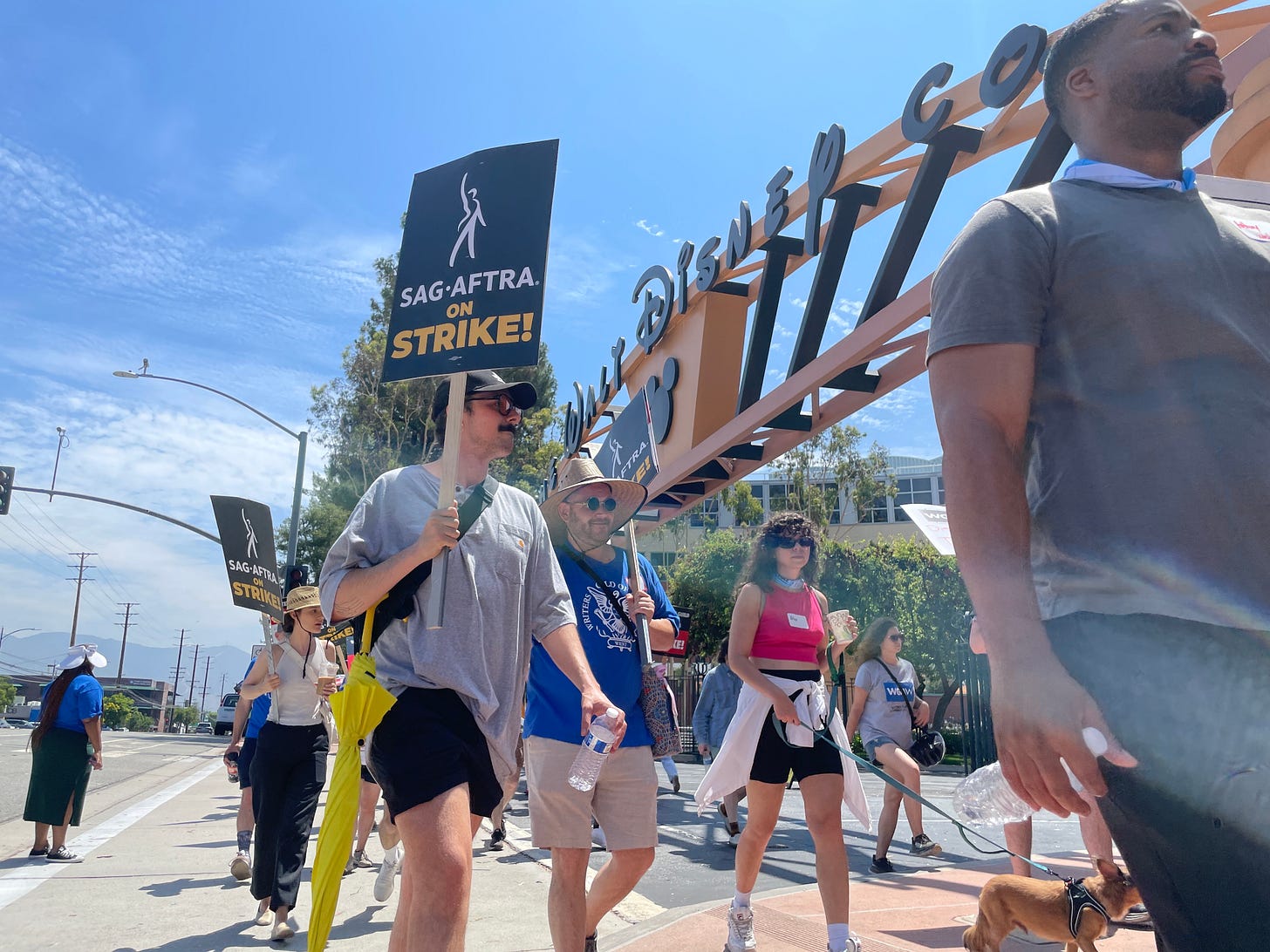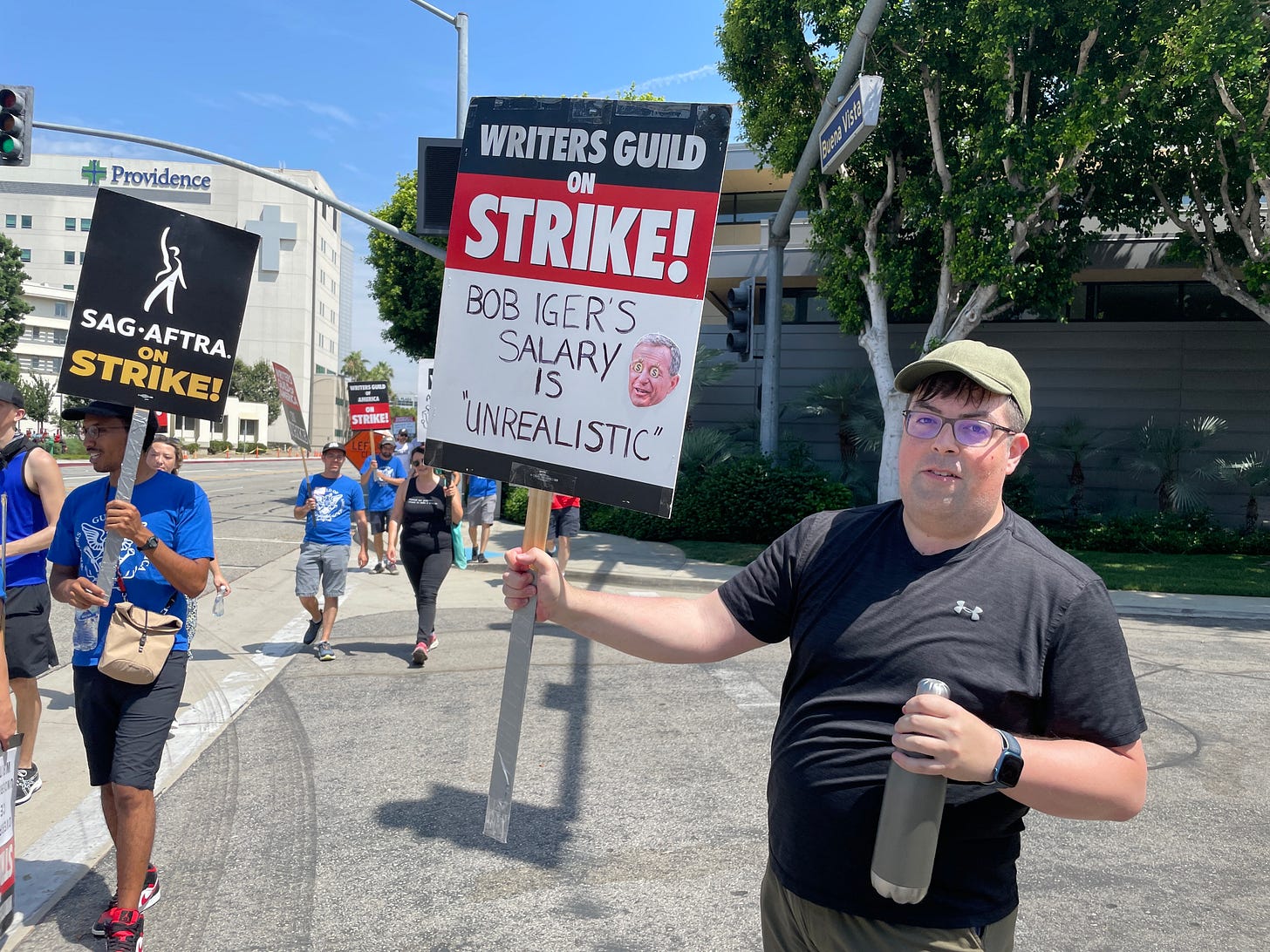Heat Is On: Actors, Writers Erupt Outside Hollywood Studios
Outside Disney, a sense of solidarity and existential panic

SAG-AFTRA and WGA member Nick Roth (American Housewife) wrote a colorful email to me over the weekend (that I am including here with his permission):
For me this strike is an opportunity to take a good hard look at a general business culture that puts profits over people and the pernicious myth that the overall success of huge corporate conglomerates will trickle down to everyone. It’s bullshit. Wall Street is bullshit. Every CEO is bullshit. It’s all fucking nothing but a transparent scam to funnel wealth into the hands of the few at the expense of the many. Actors, writers, and crews do 100% of the work and these oligarch dipshits do absolutely nothing of any human value, and everyone knows it. Well now we are saying: NOPE. These chode-faced fatcats have fucked around enough, and now they’re gonna find out. The industry has to work for its workers or we’ll burn it to the ground.
So yeah, there is angst, frustration and feelings are raw. So what better place for me to go than the Happiest Place on Earth? Around 10:30 a.m. earlier today, I drove over to check out the scene at Disney.
Boba Fett and Greedo are marching around the block at Disney studios, picket signs in hand, while a stray Mandalorian whizzes down Riverside Drive on an electric skateboard. (To be clear, Mando does not appear to be actively picketing; he’s just a regular sight in Burbank.)
Never mind that it is already a sweltering 85 degrees in the Valley by late morning. Several hundred actors and writers swarm outside Bob Iger’s magic castle for hours — Day 4 of the actors strike and Day 77 of the ongoing writers strike — alongside support staffers and IATSE crew members who feel compelled to back their colleagues in SAG-AFTRA and the Writers Guild of America.
The fully costumed Boba Fett (who would only tell me his name is Scott) is a member of IATSE Local 80, which represents motion picture grips, craft services, marine, first aid and warehouse workers. AI technology, which he says he saw used on productions years ago, spurred him to action.
“For it to be coming back and being a hot issue, that’s one of the reasons I personally had to come out and show support,” Scott tells me.
As the SAG-AFTRA strike erupts outside Hollywood’s major studios — fueling the first concurrent actors-writers strike in 63 years — the growing sense of solidarity and existential panic booms louder than ever. How long is the membership prepared to strike to resolve that feeling? According SAG-AFTRA president Fran Drescher, up to six months.
Christopher Gorham, a familiar face from Ugly Betty, Covert Affairs and countless other network and cable TV series, says that “it’s become almost impossible for everyday actors and writers to make a living in this business anymore. From the acting side, unless you’re a series regular on a TV show or a movie star, you can’t raise a family in New York or L.A. anymore.”
SAG-AFTRA’s TV/theatrical contract has “failed to keep up” with the rapid changes to the industry in the streaming era, he continues. The other actors and writers I spoke to on the Disney lot were also quick to point out the new factors that have made it harder to sustain a career, thanks to direct-to-consumer entertainment: shorter TV seasons, longer stretches between seasons, fewer residuals, and so on.
“When I started doing a show on network TV, you’re doing it 22 episodes a year, you’re working 10 months out of the year, you have exclusivity clauses — but it doesn’t really matter because you don’t have time to go work on anything else anyway,” says Gorham. “When streaming comes into the picture, you’re now doing six episodes a year, eight episodes a year, 10 episodes a year… and you’re still held exclusively to that show so you can’t get another high-paying job to help fill in that gap.”

“Eighty-seven percent of SAG-AFTRA’s membership doesn’t make enough to qualify for health insurance. That’s $26,000,” he adds. “And that is because of how big the gap’s gotten between what our contract gives us and what the business is making.”
I hear whispers from the occasional studio or production exec who believes that those on strike are narcissistic and short-sighted about the industry, that they do not understand how the business works. And it may well be true that the average writer or actor would be hard pressed to figure out how to make the low-margin streaming economy as lucrative as the broadcast or cable models of old. Then again, the major streaming services all seem to be having much the same trouble.
The tension inherent between art and business in Hollywood isn’t exactly new. But as Netflix prepares to kick off media earnings season after the closing bell Wednesday with a sure-to-be highly scrutinized quarterly report, it’s worth noting that Wall Street is indeed taking a close eyeball to those bottom lines, looking for profit trajectories after years of rewarding a growth-at-all-costs, Peak TV-era streaming content boom.
Picketers: Why are you striking? How has your career been impacted by the streaming era? What are you hoping will change after the strike ends?
Talk to me: elaine@theankler.com.
Today in Strike News
Though studio CEOs have been the main target of guild ridicule, it might not be long before the often eight-figure salaries of A-list actors come under the microscope. (The Guardian)
According to Moody’s debt analyst Neil Begley, new collective bargaining agreements that increase compensation for all three guilds will cost companies $450 million to $600 million a year. (The Hollywood Reporter)
Many in the industry see September and the Labor Day holiday as a tipping point for serious impact on the 2024 release calendar. (New York Times)
At the first movie premiere since the onset of the double strike, Haunted Mansion was ushered in at Disneyland, where the red carpet was filled with Disney characters Mickey and Minnie Mouse, Maleficent, and Cruella de Vil, as well as a host of influencers. (CBS News)
Influencers will have to be careful, though, about their actions during the strike, as SAG-AFTRA laid out restrictions. At risk of being barred guild admission, influencers are prohibited from promoting content produced by studios and streamers, whether or not they are being paid to do so. (Vanity Fair)
At a recent picket in front of Netflix, the founder of #PayUpHollywood, Liz Alper, and fellow speakers addressed the plight of assistants and support staff. “Liz’s group did a survey that showed 95% of assistants and support staff workers are not making enough money to live in LA,” screenwriter John August said. (Forbes)
A solution for the current actors strike might lie in revisiting the last protracted actors strike, which involved many variables similar to today, such as residuals and an array of new viewing platforms. (NPR)
On top of Los Angeles and New York, SAG-AFTRA has held and is holding “quick photo op” events in Orlando, Atlanta, and Hawaii. (Deadline)
Picket Sign of the Day
IATSE Local 871 member and script coordinator Andrew Fazekas felt “inspired” to create this sign after Iger’s controversial interview in Sun Valley last week, in which the Disney chief exec called strikers’ expectations “unrealistic.”








❤️ that sign!